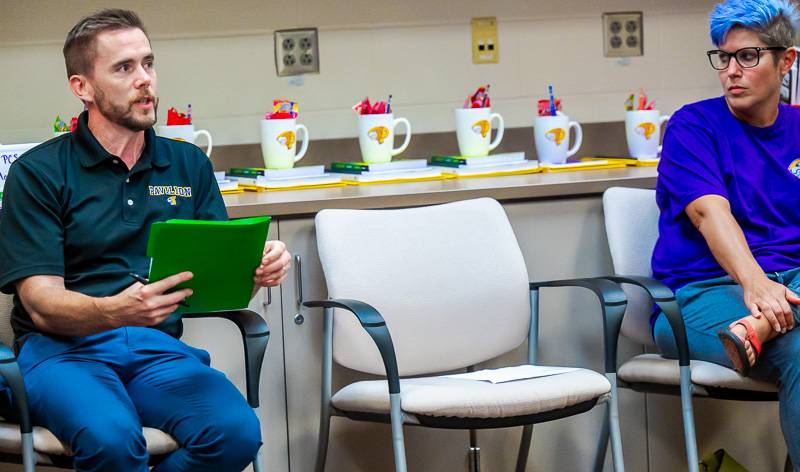
Photo by Howard Owens.
Like every other school district in the nation, Pavilion Central School District teachers and administrators are frustrated by the distractions and problems created by students with mobile communication devices, particularly mobile phones.
"When you ask teachers, what's the one thing we could do to get kids more focused in school and in the classroom, it would probably be the removal of cell phones," said Charles Martelle, Pavilion's high school principal. "That doesn't mean we can come up with a way to do it that doesn't cause more distractions."
It's a problem even in elementary school, said principal Tom Wilson, and Carin Wade, a ninth-grade language teacher, chimed in with, "It's awful."
She added, "They can put it in their pockets and you don't even see it. They can text without looking at their phones. I mean, you've got 25 kids in a classroom and you can't -- it's terrible."
During the discussion of outright bans, Wade said it's been tried at Pavilion, and parents complained.
Parents, one administrator said, are part of the problem.
"I understand the safety side of it, but at the end of the day, parents shouldn't be texting their kids during class," he said.
"And they know they are," Wade said. "They know their kids are in class, and the kids will be like, 'But it's my mom,' and I'm like, 'OK, but you're in class. I don't understand.'"
The policy for 2023-24 will be the same as last academic year, which uses a color-coded system to let students know where and when they can touch their phones.
In the green zones -- hallways and the cafeteria, they get close to unlimited access to their phones (they're not supposed to take pictures or make audio or video clips). In gold zones, such as most classrooms, they can only access a phone with teacher permission. And in red zones, phones cannot be touched or displayed at all. This includes bathrooms, locker rooms, and the auditorium.
If a student is caught in violation of the policy, a staff member can collect the phone and leave it in the main office, where a parent or guardian must pick it up.
The discussion at Monday's meeting indicated even this policy leaves much to be desired when it comes to limiting distractions caused by electronic devices.
Schools have tried outright bans, but Martelle said there's no evidence these bans achieve favorable outcomes. Some schools have tried lockable pouches that students must store the device during the school day, getting the pouch unlocked by a staff member at the end of the day, but some school districts, Martelle said, found that students use "burner phones," phones they don't really use, to dump in the pouches.
"If there's a plan that actually worked and serves our interests that was more strict, we would use it," Martelle said. "I think a lot of schools are (implementing more strict policies), so we'll be able to look at articles and literature and studies. Right now, it's really up in the air. The studies as to whether or not schools that have done this versus those that haven't, the studies are really kind of inconclusive. We're looking at different things as to whether it actually improves anything in schools or not or whether it's effective."
He said administrators are open-minded about finding a better way of dealing with the problem.
"It's a very difficult problem right now," he said.
